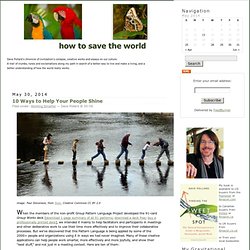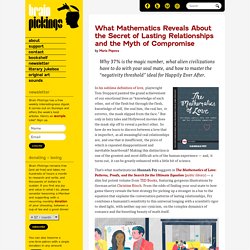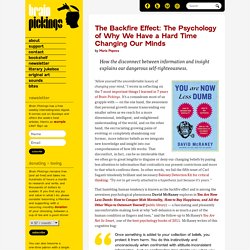

Stuart Brown: Play is more than just fun. 10 Ways to Help Your People Shine. Image: Paul Stevenson, from flickr, Creative Commons CC BY 2.0 When the members of the non-profit Group Pattern Language Project developed the 91-card Group Works deck [download 1-page summary of all 91 patterns; download a deck free; buy a professionally printed deck], we intended it mainly to help facilitators and participants in meetings and other deliberative work to use their time more effectively and to improve their collaborative processes.

But we’ve discovered that this Pattern Language is being applied by some of the 2000+ people and organizations using it in ways we had never imagined. Many of these creative applications can help people work smarter, more effectively and more joyfully, and show their “best stuff,” and not just in a meeting context. Here are ten of them: 1. Image: chart from City of Calgary Cultural Transformation Project Dream Phase 2013 draft report What are your people’s shared values? 2. Do you create such spaces for your people? 3. 4. 5. 6. 7. 8. 9. 10. What Mathematics Reveals About the Secret of Lasting Relationships and the Myth of Compromise.
By Maria Popova Why 37% is the magic number, what alien civilizations have to do with your soul mate, and how to master the “negativity threshold” ideal for Happily Ever After.

In his sublime definition of love, playwright Tom Stoppard painted the grand achievement of our emotional lives as “knowledge of each other, not of the flesh but through the flesh, knowledge of self, the real him, the real her, in extremis, the mask slipped from the face.” But only in fairy tales and Hollywood movies does the mask slip off to reveal a perfect other. So how do we learn to discern between a love that is imperfect, as all meaningful real relationships are, and one that is insufficient, the price of which is repeated disappointment and inevitable heartbreak? Making this distinction is one of the greatest and most difficult arts of the human experience — and, it turns out, it can be greatly enhanced with a little bit of science. She writes in the introduction: Fry explains: She breaks down the equations:
A Useful Idea. The Backfire Effect: The Psychology of Why We Have a Hard Time Changing Our Minds. By Maria Popova How the disconnect between information and insight explains our dangerous self-righteousness.

“Allow yourself the uncomfortable luxury of changing your mind,” I wrote in reflecting on the 7 most important things I learned in 7 years of Brain Pickings. It’s a conundrum most of us grapple with — on the one hand, the awareness that personal growth means transcending our smaller selves as we reach for a more dimensional, intelligent, and enlightened understanding of the world, and on the other hand, the excruciating growing pains of evolving or completely abandoning our former, more inferior beliefs as we integrate new knowledge and insight into our comprehension of how life works. That discomfort, in fact, can be so intolerable that we often go to great lengths to disguise or deny our changing beliefs by paying less attention to information that contradicts our present convictions and more to that which confirms them. So where does this leave us? Donating = Loving. Do You Procrastinate? Maybe It's A Form Of Wisdom. Procrastination can make us feel guilty, unproductive, riddled with failure.

You know what it feels like and how it looks: Just one more round of checking social media. A spontaneous Netflix marathon. That closet that suddenly really needs to be organized. What if I told you that procrastination can be a form of wisdom? In an age of “instant” and “gotta-make-it-happen-now” productivity, our hesitation can (erroneously) be labeled as procrastination. Look, we all put things off. How can you actually benefit from your procrastination? 1. Are you hesitating because you doubt your abilities? 2. Ask yourself: What about these circumstances has me pausing? 3. Maybe you like the work you’re doing but not the client. Think about what you can change, quit, and delegate. When you examine your procrastination, you get clear.
Photo Credit: Shutterstock.com We're thrilled to present revitalize, a two-day summit with wellness experts from around the world. Go.